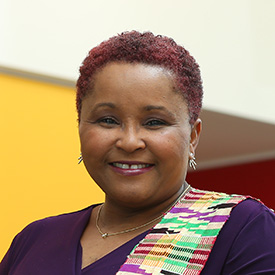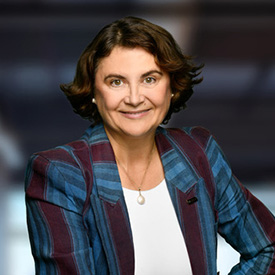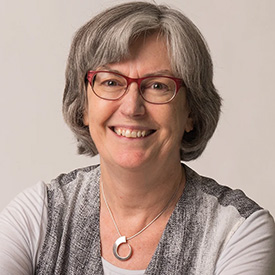Discovery and innovation are in the spotlight Thursday night (November 14) as researchers from across Nova Scotia gather for the 22nd annual .
The awards celebrate the best and brightest in science and technology in the province, with awards honouring science champions, research professionals and more. Dalhousie is typically well-represented at this yearâs event, with nominees in every competitive category and Engineeringâs Dr. Paul Amyotte set to be inducted into the Hall of Fame.
The Public Impact Award, sponsored by Research Nova Scotia, is a relatively recent addition to the Discovery Awards, first presented in 2022. It recognizes a Nova Scotian researcher whose work has benefited Nova Scotians by tangibly improving the economy, environment, health-care system, or society at large. It celebrates research that responds to the needs of society by solving a problem, managing a risk, or creating an opportunity for Nova Scotians.
For the second year in a row, all three of the finalists for the Public Impact Award are Dalhousie faculty. (Last yearâs recipient was Dr. Steven Beyea from the Department of Diagnostic Radiology and Innovation Strategy Advisor with IWK Health). Update November 15: Dr. Gabriela Ilie of the Faculty of Medicine took home the award at Thursday night's ceremony.
We wanted to sit down with each of the nominees for a conversation about the public impact their research has had â and why that matters to them.
Dr. Barb Hamilton-Hinch
School of Health and Human Performance, Faculty of Health
 A health researcher by profession, Dr. Barb Hamilton-Hinch studies the effects of structural, systemic, and institutional racism on diverse populations, particularly people of African descent. She brings this understanding to her extensive work opening doors and breaking down barriers to education, whether thatâs as co-founder of Imhotepâs Legacy Academy, her work helping create the PLANS program, (Promoting Leadership in health for African Nova Scotians) or as Dalâs Assistant Vice-Provost of Equity and Inclusion. It is not a coincidence that her research collaborative is called âOn These Shouldersâ â her work helps lift people up to show them whatâs possible through the sacrifices of others.
A health researcher by profession, Dr. Barb Hamilton-Hinch studies the effects of structural, systemic, and institutional racism on diverse populations, particularly people of African descent. She brings this understanding to her extensive work opening doors and breaking down barriers to education, whether thatâs as co-founder of Imhotepâs Legacy Academy, her work helping create the PLANS program, (Promoting Leadership in health for African Nova Scotians) or as Dalâs Assistant Vice-Provost of Equity and Inclusion. It is not a coincidence that her research collaborative is called âOn These Shouldersâ â her work helps lift people up to show them whatâs possible through the sacrifices of others.
Advocating for possibility: âWhatâs guided my work has been wanting to make a difference for my community, for people of African descent, and to improve their quality of life. And that extends to supporting other populations that have been marginalized, whether thatâs Indigenous populations, our 2SLGBTQ+ communities, low-income communities, persons with disabilities, individuals who have been incarcerated. Because I know what it's like to have been considered marginalized, and for people not to realize that marginalization is because of what's been done to people â because of the structural, systemic, and institutional racism that exists. I want to be that advocate to help show people whatâs possible for them and to bring their stories to light.â
Work that belongs to everyone: âI did my PhD defence in 2016, which talked about the impact of racism on the health and well-being of women of African descent living in Nova Scotia. I was the first African Nova Scotian to graduate with a PhD from Dalhousie. I knew how significant that was, and so I opened up my defence to the public because I felt my PhD belonged to my community. We had over 100 people show up; there was almost no place to sit. It was amazing, seeing the support and love and being able to answer peopleâs questions and then feeling confident that this work does make a difference, that this research can impact and change peopleâs lives.â
Showcasing community: âMy research is bigger than me, and it's continued to grow to have impacts locally, nationally and internationally. And even at that scale, it often leads back home to the uniqueness of our community of people of African descent here in Nova Scotia. We have the largest historical Indigenous Black population in Canada. Iâm eighth-generation African Nova Scotian, but I didnât learn or read about our rich history as a student or even as a scholar. My research helps bring our distinctiveness to the forefront.â
Changing the face of the field: âOne of the things that makes me excited about the work that I do is that I'm able to help change the faces of STEM, the faces of health care, and influence education. And I know that I'm not doing that alone, and that the work is having an impact. When I go to Convocation at Dal, I get to see the number of scholars who look like me who are graduating in science, and engineering, and technology, math and the health professions, including medicine and dentistry. I know the work that I am a part of is contributing to this increase, even though we still have room to grow and advance more opportunities for populations who have been marginalized.â
Dr. Gabriela Ilie
Department of Community Health & Epidemiology, Faculty of Medicine
 âEmpowermentâ is a critical phrase in the research of Dr. Gabriela Ilie, the Soillse Scientific Chair in Prostate Cancer Quality of Life Research. Her work focuses on understanding the needs and challenges of people with chronic diseases, particularly cancer, and using evidence-based approaches to improve care delivery and quality of life. Her teamâs pioneering work on Patient Empowerment Programs (PEPs) â a transformative six-month program providing guidance on managing their own health â is reshaping how patients achieve ongoing health and resilience as PEPs are expanded across the province.
âEmpowermentâ is a critical phrase in the research of Dr. Gabriela Ilie, the Soillse Scientific Chair in Prostate Cancer Quality of Life Research. Her work focuses on understanding the needs and challenges of people with chronic diseases, particularly cancer, and using evidence-based approaches to improve care delivery and quality of life. Her teamâs pioneering work on Patient Empowerment Programs (PEPs) â a transformative six-month program providing guidance on managing their own health â is reshaping how patients achieve ongoing health and resilience as PEPs are expanded across the province.
The power of empowerment: âPatient Empowerment Programsâ (PEP) empower patients to be active participants in their health journeys. With daily emails and videos, we guide participants in adopting healthier habits in exercise, nutrition, sleep, stress management, and emotional well-being. Our program doesnât just address symptoms â it restores a sense of autonomy, confidence, and hope. The feedback we receive from participants and their families reminds us that our work is not only advancing the science of survivorship but also transforming lives, making health care more compassionate, holistic, and truly impactful.â
Why it counts: âEach week, we receive heartfelt messages of gratitude from family members who tell us how their loved ones are more active, healthier, eating better, laughing more often, and no longer allowing medical appointments to overshadow their lives. This transformation is a testament to the power of PEP, proving that our work is making a unique, lasting impact on families across Nova Scotia. Every story of resilience and renewed hope confirms the unique value of PEP; itâs not just life-prolonging, but life-enhancing.â
Forging community: âOur research harnesses technology to sustain patient education and empowerment, driving transformative change within the health-care system. This approach bridges critical gaps in care delivery, allowing us to translate scientific findings into accessible, actionable insights for cancer-support groups, while mentoring the next generation of researchers and health-care professionals. Our aim is to create empowered communities that extend the benefits of PEP beyond the individual to their families and communities, ultimately fostering sustainable Blue Zones of well-being â areas where populations live longer, healthier, and more fulfilled lives.â
Patient-centred research: âWe take the feedback from patients and our âresearch citizensâ very seriously, as their insights are integral to the programâs success. If you examine our published qualitative interviews over the years, youâll see a clear trend: our early studies consistently inform our later ones. The changes weâve implemented often diverge from a traditional âtop-downâ scientific approach; instead, they embody a âbottom-up,â patient-informed model. These changes may not always have made sense from an academic or theoretical perspective, but they made perfect sense when guided by the real-life experiences and insights of our patients. In my view, patient engagement in all health-related research is non-negotiable â it is an absolute must.â
Dr. Isabel Smith
Division of Pediatrics, Faculty of Medicine
 Nova Scotia has been a national leader in early intervention programs for young children navigating life with autism spectrum disorder (ASD). The work of Dr. Isabel Smith, who retired from the Joan and Jack Craig Chair in Autism Research this past July, has been foundational in this effort, helping ensure that available supports and programs align with rapidly evolving research while continuing to meet the needs of families. Through her own research as part of Dal-IWKâs Autism Research Centre, and through engagement with clinicians, researchers, and policy makers across the province and beyond, Dr. Smith is helping give children and families the tools they need to succeed.
Nova Scotia has been a national leader in early intervention programs for young children navigating life with autism spectrum disorder (ASD). The work of Dr. Isabel Smith, who retired from the Joan and Jack Craig Chair in Autism Research this past July, has been foundational in this effort, helping ensure that available supports and programs align with rapidly evolving research while continuing to meet the needs of families. Through her own research as part of Dal-IWKâs Autism Research Centre, and through engagement with clinicians, researchers, and policy makers across the province and beyond, Dr. Smith is helping give children and families the tools they need to succeed.
Keeping up with the science: âOur conception of autism as a condition has changed dramatically during my almost 40-year career. It requires continuous evaluation: we need to ensure that our services are responsive to the evidence of what works and whatâs helpful to families. You can't have a broader public impact unless it has that more local family-level impact, where they feel that their child is getting intervention that is going to make a difference for them.â
Research with impact: âI never wanted to be a researcher who sat in a lab and wrote and published papers without knowing what would come of them. When I started in autism research in the 1980s, I realized how little support there was for families. I was meeting families and kids who were struggling because they didnât have the support in place to optimize their development. So I knew I wanted to do research that was clinically focused, that addressed the needs that I saw, and what families felt was important.â
Changing the system, changing lives: âIn 2011, the province announced the expansion of the early intervention autism intervention program, and the impetus for that was really the strong evidence from our work that it was making an enormous difference across the board for families. That was a big thing to see: a government dedicating more funding to something because it worked, and we knew it worked because of the evidence weâd published. But itâs also about the smaller moments, when Iâm or a member of my research staff is talking to families about how interventions weâve developed and evaluated have changed their lives. I remember one family talking about that the effect of the intervention having been that they no longer walked on eggshells when they had their child out in the community because they knew how to support them better. They were less afraid and were able to live their lives together more fully.â
Passing it on: âOver my career, I've fostered a network of clinicians who work with families of kids with autism and tried to facilitate not only peer consultation among them, but bringing the results of research to them, both our own and whatâs out there in the literature that they may not have time to read and absorb. Weâve organized professional development opportunities, research presentations, discussed articles together. That work isnât always as visible [as other things we do], but itâs important to help sustain a culture of research that informs clinical practice, and my impression from my colleagues is itâs made a real difference.â
For more on the Discovery Awards, .

